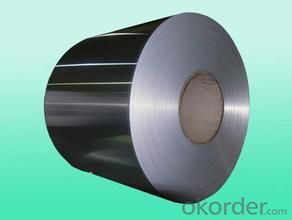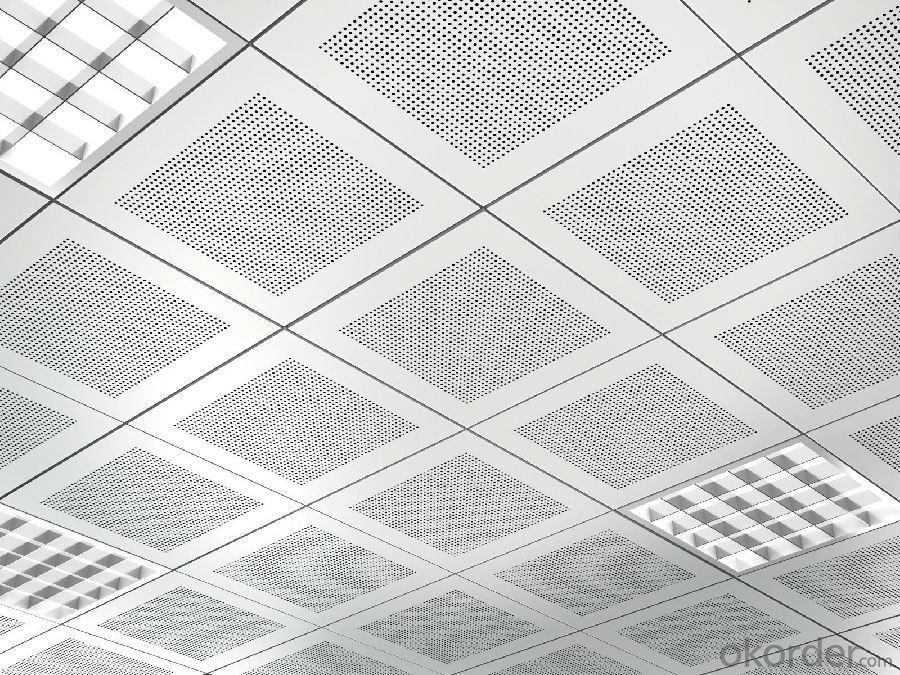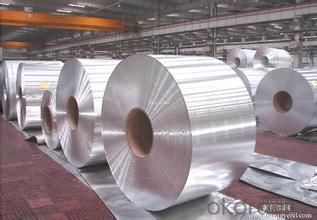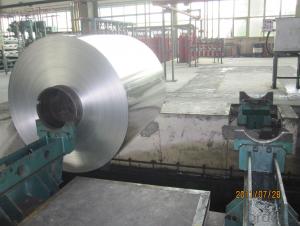CC Aluminium in Coil Form for house ceiling
- Loading Port:
- Shanghai
- Payment Terms:
- TT OR LC
- Min Order Qty:
- 5 m.t.
- Supply Capability:
- 1000 m.t./month
OKorder Service Pledge
OKorder Financial Service
You Might Also Like
Item specifice
1. Structure of CC Aluminium in Coil Form for house ceiling
CC Aluminium in Coil Form for making roofing is one semi-finished aluminium material. This coil can be rolled down to aluminium coil,sheet,circle ect. The alloy AA1050 is widly used in building, industry ect. Its weight is much lower than steel. So many customers choosed aluminium material instead of steel.
2. Specification of CC Aluminium in Coil Form for house ceiling
Aluminum Coil/Sheet | |
Main Specification | |
Alloy | AA1xxx (AA1050, AA1060, AA1070, AA1100 etc.) |
AA3xxx (AA3003, AA3004, AA3005, AA3105 etc.) | |
AA5xxx, AA6XXX (AA5052,AA5083, AA5754, AA6061, AA6062 etc.) | |
AA8xxx(AA8011, AA8006 etc.) | |
Temper | H14,H16, H18, H22, H24, H26, H32,O/F, T4, T6, T651 |
Thickmess | 0.01mm-100mm |
Width | 30mm-1700mm |
Standard | GB/T 3880-2006/ASTM |
Special specification is available on customer's requirement | |
3. Application of CC Aluminium in Coil Form for house ceiling
(1).Interior: wall cladding, ceilings, bathrooms, kitchens and balconies, shutters, doors...
(2).Exterior: wall cladding, facades, roofing, canopies, tunnels,column covers , renovations...
(3).Advertisement: display platforms, signboards, fascia, shop fronts...
4. Feature of CC Aluminium in Coil Form for house ceiling
Surfact Quality :
Be free from Oil Stain, Dent, Inclusion, Scratches, Stain, Oxide Dicoloration, Breaks, Corrosion, Roll Marks, Dirt Streaks and other defect which will interfere with use,
Mechenical Property:
Chemical Composite and Mechanical Property
5. Certificate of CC Aluminium in Coil Form for house ceiling
SGS and ROHS(if client request, paid by client), MTC(plant provided), Certificate of Origin(FORM A, FORM E, CO), Bureau Veritas and SGS (if client request, paid by client), CIQS certificate
6. Image of CC Aluminium in Coil Form for house ceiling



7. Package and shipping of CC Aluminium in Coil Form for house ceiling
First, plastic cloth with drying agent inside; Second, Pearl Wool ; Third, wooden cases with dry agent , fumigation wooden pallets, aluminum surface could cover blue PVC film
8. FAQ
1) What is the delivery time?
Depends on actual order, around 20 to 35 days
2) What is the QC system:
We have QC staff of 20 persons and advanced equipment, each production is with MTC traced from Aluminum ingot lot.
3) What market do you mainly sell to?
Australia, America, Asia, Middle East, Western Europe, Africa etc
- Q:What house hold materials contain 100% pure aluminum. or where can i buy it. im making thermite, which ive made before so don't say, its dangerous don't do it, but do i need 100% pure aluminum or will some aluminum alloy with like 90% aluminum work?????
- Aluminum foil is your best bet. According the the Reynold's wrap web site, their foil is 98.5% aluminum.
- Q:How are aluminum coils transported and delivered?
- Aluminum coils have various transportation options, including road, rail, and sea. The choice of transportation depends on factors like distance, quantity, and urgency. For short distances, road transportation is common. Special trucks with flatbed trailers or coil carriers are used to securely transport the coils. These trucks have features like adjustable cradles or coil pads to prevent shifting during transit. Longer distances often involve rail transportation. Railcars can accommodate many coils depending on their size and weight. Rail transport is cost-effective and environmentally friendly for long-haul journeys. When coils need to be transported overseas or to another continent, sea transportation is preferred. Shipping containers protect the coils from potential damage. Cargo ships have the capacity and stability for long-distance transportation. Regardless of the mode of transportation, it is vital to handle aluminum coils carefully to prevent damage. Coils are protected from excessive vibration, impact, and adverse weather conditions. Tracking systems are used to monitor the location and condition of the coils during transportation. Overall, the transportation and delivery of aluminum coils require a well-coordinated logistics network to ensure timely and efficient delivery while minimizing the risk of damage.
- Q:How do aluminum coils perform in high-pressure applications?
- Aluminum coils generally perform well in high-pressure applications due to their inherent strength and durability. The high-pressure environment requires materials that can withstand the force and maintain their structural integrity without deformation or failure. Aluminum coils are known for their excellent tensile strength, which allows them to handle high-pressure conditions without buckling or collapsing. Furthermore, aluminum is highly resistant to corrosion, making it ideal for applications where exposure to moisture or harsh chemicals is a concern. This corrosion resistance ensures that the coils will not deteriorate or weaken over time, even under high-pressure conditions. In addition to their mechanical properties, aluminum coils also possess excellent thermal conductivity. This property allows them to efficiently transfer heat away from the high-pressure environment, thereby preventing overheating and maintaining stable operating conditions. The thermal conductivity of aluminum also aids in rapid heat dissipation, enhancing the overall performance of the coils in high-pressure applications. Moreover, aluminum coils are lightweight compared to other metals, making them easier to handle and install in high-pressure systems. Their lightweight nature also reduces the overall weight of the system, which can have advantages in terms of energy consumption and transportation costs. However, it is important to note that the specific performance of aluminum coils in high-pressure applications may vary depending on the grade and thickness of the aluminum used. It is crucial to select the appropriate aluminum alloy and gauge based on the specific requirements of the application to ensure optimal performance and longevity.
- Q:Can aluminum coils be used in signage applications?
- Yes, aluminum coils can be used in signage applications. Aluminum is a popular material for signage due to its durability, corrosion resistance, and lightweight nature. It can be easily formed into various shapes and sizes, making it suitable for different types of signage such as outdoor signs, billboards, trade show displays, and more. Additionally, aluminum coils offer excellent weather resistance, ensuring that the signage remains intact and vibrant even in harsh environmental conditions. The versatility and longevity of aluminum make it a preferred choice for signage applications in various industries.
- Q:Are aluminum coils suitable for solar panel applications?
- Solar panel applications can benefit from the use of aluminum coils. This lightweight and highly conductive material offers several advantages. Firstly, aluminum coils effectively transfer and dissipate heat, playing a crucial role in maintaining solar panel efficiency and lifespan. By reducing the temperature of solar cells, aluminum's excellent thermal conductivity helps prevent overheating and potential damage. Furthermore, aluminum coils exhibit high resistance to corrosion, making them an ideal choice for outdoor solar panel installations. Given the exposure to various weather conditions like rain, snow, and humidity, solar panels are prone to corrosion and degradation. However, aluminum's natural oxide layer acts as a protective barrier, ensuring corrosion prevention and enhancing the durability of solar panels. Moreover, aluminum is a cost-effective material that is readily available and easy to manufacture. Additionally, its lightweight nature simplifies the transportation and installation of solar panels, resulting in reduced overall costs. To summarize, aluminum coils are a suitable option for solar panel applications due to their exceptional thermal conductivity, resistance to corrosion, durability, and cost-effectiveness.
- Q:Can aluminum coils be used for architectural facades?
- Yes, aluminum coils can be used for architectural facades. Aluminum is a popular material for architectural applications due to its lightweight nature, durability, and flexibility. It can be easily molded and shaped into various forms, making it suitable for creating unique and aesthetically pleasing facades. Additionally, aluminum is resistant to corrosion, making it a long-lasting choice for exterior applications.
- Q:How are aluminum coils used in the manufacturing of cookware?
- Aluminum coils are widely used in the manufacturing of cookware due to their excellent heat conductivity and lightweight nature. Cookware manufacturers typically use aluminum coils as the primary material for constructing the bases and bodies of pots, pans, and other cooking utensils. Firstly, aluminum coils are rolled out and then cut into different shapes and sizes depending on the desired cookware product. These coils are preferred over other materials, such as stainless steel or cast iron, because aluminum conducts heat more efficiently. This allows for even distribution of heat across the surface of the cookware, ensuring that food cooks evenly and thoroughly. Additionally, aluminum coils are lightweight, making the resulting cookware easier to handle and maneuver. This is particularly beneficial for professional chefs and home cooks who often need to lift and move pots and pans during the cooking process. Moreover, aluminum is a malleable material, meaning it can be easily shaped and formed into various cookware designs and styles. Whether it's a saucepan, frying pan, or baking tray, aluminum coils can be molded to create the desired shape and size, allowing for versatility in cookware manufacturing. Furthermore, aluminum has a natural resistance to corrosion, making it a durable choice for cookware. It does not react with acidic or alkaline ingredients commonly used in cooking, ensuring that the cookware remains safe for food preparation and cooking. Lastly, aluminum coils can be treated with non-stick coatings, such as Teflon, to create non-stick cookware. These coatings provide an additional layer of convenience, allowing for easy food release and hassle-free cleaning. In summary, aluminum coils play a crucial role in the manufacturing of cookware by providing excellent heat conductivity, lightweight construction, versatility in design, durability, and the option for non-stick coatings. These qualities make aluminum coils an ideal choice for producing high-quality cookware that delivers superior cooking performance and convenience in the kitchen.
- Q:Can aluminum coils be used in the production of beverage cans?
- Yes, aluminum coils can be used in the production of beverage cans. Aluminum is a preferred material for the manufacturing of beverage cans due to its lightweight, durability, and ability to preserve the taste and quality of the contents. Coils made of aluminum are typically used in the canning process as they can be easily shaped into a can form. The coils are rolled into sheets, which are then cut and formed into cans. Aluminum coils also have excellent heat conductivity, allowing for efficient cooling and faster production speeds. Overall, aluminum coils are an essential component in the production of beverage cans and are widely used in the industry.
- Q:What are the different coil winding methods for aluminum coils?
- There are several coil winding methods for aluminum coils, including hand winding, machine winding, and automated winding. Hand winding is a manual process where the wire is carefully wrapped around the coil by hand. Machine winding involves using a winding machine that automatically wraps the wire around the coil, increasing efficiency and accuracy. Automated winding takes it a step further by utilizing robotic arms or other automated systems to wind the coils, providing even greater precision and speed.
- Q:What are the different sizes available for aluminum coils?
- Aluminum coils are available in various sizes to meet the diverse needs of different industries and applications. The sizes of aluminum coils can vary depending on factors such as the intended use, manufacturing process, and customer requirements. Generally, aluminum coils are available in a range of thicknesses, typically ranging from 0.2mm to 8mm. The width of aluminum coils can vary from as narrow as a few inches to more than 60 inches. The length of aluminum coils can be customized, but standard lengths are often around 1000mm to 6000mm. The specific sizes available for aluminum coils may also depend on the manufacturing capabilities of the supplier or manufacturer. Some suppliers may offer a wide variety of sizes to cater to different customer demands, while others may have a more limited range of sizes. It is important to note that the availability of specific sizes may also be subject to minimum order quantities or lead times. Therefore, it is advisable to consult with the supplier or manufacturer to inquire about the specific sizes available and any limitations or requirements that may apply. Overall, the different sizes available for aluminum coils provide flexibility for customers to choose the most suitable dimensions for their specific applications and requirements.
1. Manufacturer Overview |
|
|---|---|
| Location | |
| Year Established | |
| Annual Output Value | |
| Main Markets | |
| Company Certifications | |
2. Manufacturer Certificates |
|
|---|---|
| a) Certification Name | |
| Range | |
| Reference | |
| Validity Period | |
3. Manufacturer Capability |
|
|---|---|
| a)Trade Capacity | |
| Nearest Port | |
| Export Percentage | |
| No.of Employees in Trade Department | |
| Language Spoken: | |
| b)Factory Information | |
| Factory Size: | |
| No. of Production Lines | |
| Contract Manufacturing | |
| Product Price Range | |
Send your message to us
CC Aluminium in Coil Form for house ceiling
- Loading Port:
- Shanghai
- Payment Terms:
- TT OR LC
- Min Order Qty:
- 5 m.t.
- Supply Capability:
- 1000 m.t./month
OKorder Service Pledge
OKorder Financial Service
Similar products
New products
Hot products
Related keywords






























